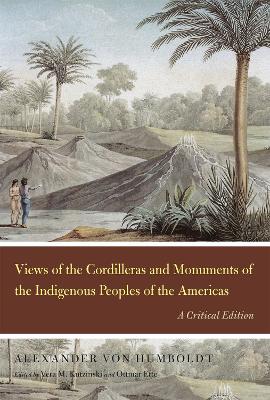Alexander von Humboldt in English (Chicago UP)
2 total works
Views of the Cordilleras and Monuments of the Indigenous Peoples of the Americas
by Alexander von Humboldt
Published 1 January 2013
In 1799, Alexander von Humboldt and Aime Bonpland set out to determine whether the Orinoco River connected with the Amazon. But what started as a trip to investigate a relatively minor geographical controversy became the basis of a five-year exploration throughout South America, Mexico, and Cuba. The discoveries amassed were staggering, and much of today's knowledge of tropical zoology, botany, geography, and geology can be traced back to von Humboldt's numerous records of these expeditions. One of these accounts, "Views of the Cordilleras and Monuments of the Indigenous Peoples of the Americas", firmly established von Humboldt as the founder of Mesoamerican studies. In Views of the Cordilleras, von Humboldt weaves together drawings and detailed texts to achieve multifaceted views of cultures and landscapes across the Americas. In doing so, he offers an alternative perspective on the New World, combating presumptions of its belatedness and inferiority by arguing that the "old" and the "new" world are of the same geological age.
This critical edition contains a new, unabridged English translation of von Humboldt's French text, as well as annotations, a bibliography, and all sixty-nine plates from the original edition.
This critical edition contains a new, unabridged English translation of von Humboldt's French text, as well as annotations, a bibliography, and all sixty-nine plates from the original edition.
Political Essay on the Island of Cuba
by Professor Alexander Von Humboldt and Alexander von Humboldt
Published 1 January 2011
The research Alexander von Humboldt amassed during his five-year trek through the Americas in the early nineteenth century proved foundational to the fields of botany, geography, and geology. But his visit to Cuba during this time yielded observations that extended far beyond the natural world. "Political Essay on the Island of Cuba" is a physical and cultural study of the island nation. In it, Humboldt denounces colonial slavery on both moral and economic grounds and stresses the vital importance of improving intercultural relations throughout the Americas. Humboldt's most controversial book, "Political Essay on the Island of Cuba" was banned, censored, and willfully mistranslated to suppress Humboldt's strong antislavery sentiments. It re-emerges here, newly translated from the original two-volume French edition, to introduce a new generation of readers to Humboldt's astonishing multiplicity of scientific and philosophical perspectives. In their critical introduction, Vera M. Kutzinski and Ottmar Ette emphasize Humboldt's rare ability to combine scientific rigor with a cosmopolitan consciousness and a deeply felt philosophical humanism.
The result is a work on Cuba of historical import that will attract historians of science as well as cultural historians, political scientists, and literary scholars.
The result is a work on Cuba of historical import that will attract historians of science as well as cultural historians, political scientists, and literary scholars.

